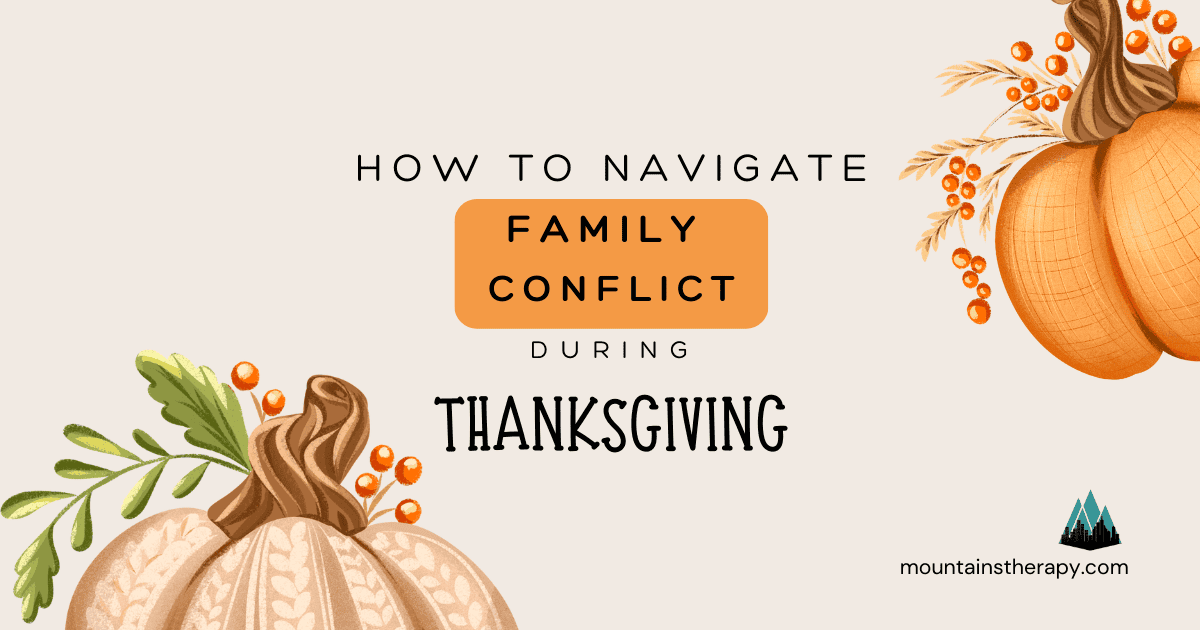How to Navigate Family Conflicts During the Thanksgiving Holidays

Learn more about Family Counseling here and Individual Counseling here.
Thanksgiving often evokes images of joyful gatherings and shared gratitude. However, for many, it also brings family conflict, grief, and tension to the forefront. Navigating these challenges can feel overwhelming, especially when coupled with the weight of past losses, unresolved issues, or heightened emotions.
At Mountains Therapy, our team of family therapists, grief counselors, and relationship therapists understands the complexity of family dynamics during the holidays. This guide explores practical ways to manage family conflict, address grief, and find peace amidst the chaos.
Why Family Conflict Arises During the Holidays
1. High Expectations and Emotional Triggers
Holidays often come with high expectations for harmony and joy. When reality doesn’t match these ideals, it can lead to disappointment and emotional outbursts.
2. Unresolved Family Issues
Thanksgiving gatherings can bring together people who may have long-standing disagreements or unresolved conflicts. These past tensions may resurface, creating friction.
3. Estrangement and Grief
For some, Thanksgiving highlights estrangement from family members or reminds them of loved ones who are no longer present. These emotions can add to the complexity of family dynamics.
4. Stress and Fatigue
Hosting, traveling, and coordinating family events can leave everyone feeling stressed and short-tempered, increasing the likelihood of conflicts.
Strategies to Navigate Family Conflicts
1. Set Realistic Expectations
Understand that no family is perfect. Accepting imperfections can reduce the pressure for a "perfect holiday" and create space for genuine interactions.
2. Practice Open Communication
Before the holiday, discuss plans, expectations, and boundaries with family members. Clear communication can prevent misunderstandings that lead to tension.
3. Establish Healthy Boundaries
If certain topics or interactions are likely to trigger conflict, set boundaries to protect your emotional well-being. For example, you might agree to avoid controversial subjects like politics or religion.
4. Focus on Coping Tools and Anxiety Goals for Therapy
Holidays can heighten stress and anxiety. Work with an individual therapist to develop anxiety goals for therapy, such as learning breathing techniques or practicing mindfulness during heated moments.
5. Take Breaks When Needed
If conflicts arise, step away to collect yourself. A brief walk, a deep-breathing exercise, or even a moment of quiet reflection can help you re-center.
6. Prioritize Self-Care
Amidst the holiday bustle, make time for activities that nurture you. Whether it’s journaling, meditating, or simply relaxing with a book, self-care is essential for maintaining emotional balance.
Dealing with Grief and Loss During Family Gatherings
The absence of a loved one or estranged relationships can add another layer of emotional complexity. Here’s how to cope:
1. Acknowledge the Loss:
It’s okay to feel sadness or longing. Honoring your emotions can help you process grief more effectively.
2. Create New Traditions:
If old traditions bring up painful memories, consider creating new ones that better reflect your current needs.
3. Seek Support:
Talking with a grief counselor or individual therapist can help you navigate feelings of loss and find coping strategies
.
Tips for Resolving Conflicts Constructively
When conflicts arise, approach them with a mindset of understanding rather than escalation.
1. Listen Actively:
Give others the space to express themselves without interrupting.
2. Use "I" Statements:
Share your feelings and needs without blaming others. For example, say, "I feel overwhelmed when..." instead of "You always make things difficult."
3. Find Common Ground:
Focus on shared goals, like creating a peaceful holiday atmosphere, to move the conversation forward.
When to Seek Professional Help from Therapists & Counselors
If family conflicts feel unmanageable or are impacting your emotional well-being, it may be time to seek professional support. At Mountains Therapy, we offer:
- Family Counseling to address ongoing conflicts and improve communication.
- Couples Counseling for partners navigating stress or differing family expectations.
- Individual Counseling for coping with anxiety, grief, and personal triggers.
Navigating family conflicts during Thanksgiving is no easy task, but with preparation, boundaries, and support, it’s possible to create a more positive experience. Whether you’re managing family issues, grief, or holiday stress, you don’t have to do it alone. At Mountains Therapy, our team of grief therapists, family counselors, and individual therapists is here to help you find balance and healing during the holiday season.
Contact us today to schedule a session and take the first step toward a more peaceful Thanksgiving.
POSTS
Elevate Mental Health Blog: Best Therapists of Montclair 2024
IMPORTANT: Call 988 Suicide and Crisis Lifeline 24/7, visit emergency room, or call 911, If you or someone you know are in a mental health crisis or be in danger.
All Rights Reserved | Mountains Therapy LLC










